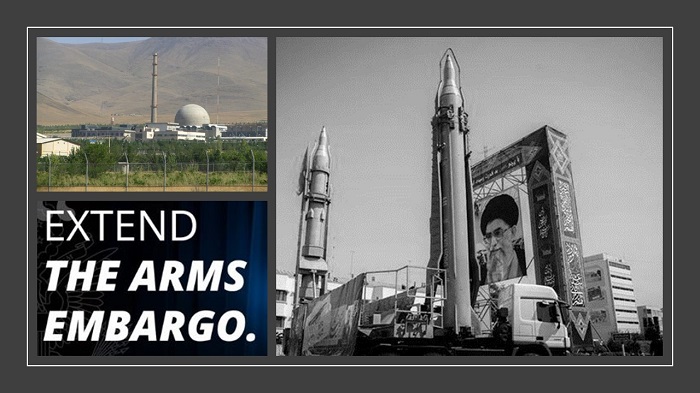

The Trump administration is adamant that it is going to continue pressuring the Iranian regime. Its current mission is to extend the arms embargo that is due to expire mid-October this year.
The Iranian regime is desperate for the arms embargo to expire and the Iranian foreign minister has reminded the signatories of the Joint Comprehensive Plan of Action (JCPOA) that it is one of the conditions of the deal.
The #IAEA resolution proves what we already knew: Tehran never abandoned its nuclear weapons program despite the #JCPOA. This regime should’ve never been allowed any enrichment capabilities, nor provided any ability to do nuclear-related research & development under any pretexts. https://t.co/ratCTs1xub
— Alireza Jafarzadeh (@A_Jafarzadeh) June 20, 2020
The Trump administration is trying to find allies in the UN Security Council that will support the US in extending the arms embargo, but so far it is a struggle.
According to the terms of the JCPOA, any “participant state” can initiate a sanctions snapback or extend the arms embargo if Iran is deemed to be not holding up to its side of the agreement. Although the United States exited the agreement, it is saying that it is still technically a participant. And this is indeed the case because resolution 2231 has not yet been amended.
However, this approach is not guaranteed to bring results. Already, Josep Borrell, the European Union’s chief of foreign policy, has said that the US has withdrawn from the deal so it cannot reasonably expect to take action as a participant.
So it looks like the United States is going to have to get another signatory of the deal to back an extension to the arms embargo. It is clear that China and Russia want the embargo to expire, with the UN Ambassador from China already confirming China’s opposition to an extension of the embargo.
This leaves the United States with the United Kingdom, France, and Germany. The US administration can in all honesty argue that Iran has been in “significant non-performance” of the JCPOA. The nuclear watchdog that oversees compliance to the deal issued a report last month stating that the regime has violated numerous restrictions. Stockpiles have been increased and Iran is breaching the limits allowed by the deal.
By: Alejo Vidal-Quadras#Iran: Negotiations like those that led to the #JCPOA will only encourage the mullahs to greet their adversaries with one hand and stab them in the back with the other. #Iranianshttps://t.co/Pl0n8hm4MT
— NCRI-FAC (@iran_policy) June 16, 2020
Furthermore, Iran is quite simply not cooperating with the IAEA (nuclear watchdog). The agency has brought up a number of concerns about secret nuclear sites in Iran and it has not been able to carry out inspections because of the regime’s refusal. The regime has not even entered into discussions to clarify queries that the IAEA has.
Iran’s behavior is worrying in many aspects, not least its nuclear extortion. It is very clear that the regime still has nuclear ambitions and that it is working towards nuclear goals. The regime is not holding up to its end of the bargain with regards to the JCPOA and it should be held accountable.
#Iran: The #Iranian regime used loopholes in its 2015 nuclear deal with world powers, formally known as the Joint Comprehensive Plan of Action (JCPOA), to secretly pursue its longtime dream of obtaining a nuclear bomb. https://t.co/1oOsQHGuWR
— NCRI-FAC (@iran_policy) June 21, 2020
For the Europeans, perhaps it would be helpful to consider what would happen if the arms embargo expired. It is already known that the regime arms terrorist proxy groups and militias in the Middle East and beyond. To take one example, look at the consequences of Iran’s support to the Houthis in Yemen where Security Council resolutions have been violated. Why would the Europeans want to enable this violent and brutal regime?
The National Council of Resistance of Iran (NCRI) obtained several reports from inside the regime, via the network of the People’s Mojahedin Organization of Iran (PMOI / MEK Iran), which indicated that Supreme Leader Ali Khamenei was compelled to embrace nuclear negotiations because of the critical conditions the mullahs’ regime was facing.
Mrs. Maryam Rajavi, has welcomed the resolution adopted by the IAEA. She says that the mullahs’ regime has never given up its overall aim of developing an atomic bomb, even 5 years after the nuclear deal made with the P5 + 1 countries. “The regime uses all the facilities and concessions that the nuclear deal has given it to pursue terrorism, foreign warfare and domestic repression,” she says.







